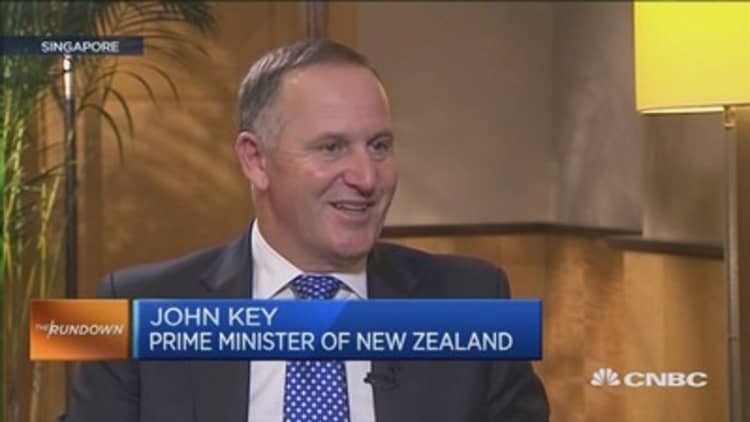
Dairy is hugely important to New Zealand's economy, making up around a third of its annual exports, but NZ Prime Minister John Key told CNBC a "perfect storm" was brewing in the industry.
Fonterra, the dairy cooperative that is NZ's largest company, on Friday cut its forecast payout to farmers for the 2015-16 season to 3.85 New Zealand dollars per kg of milk solids, the lowest in 10 years. Just a year ago, Fonterra set an all-time record, paying out NZ$8.40 for 2013-14.
But those record payouts spurred farmers to increase production, now contributing to the primary problem - oversupply - seemingly from all quarters, with global dairy prices at a 13-year low.
"There's a perfect storm happening in dairy, unfortunately, butnevertheless it is. And it's a little bit unusual in the sense thatit's not one specific thing" spurring the production surge, Keysaid.

Dairy farm conversions and output have increased in both the U.S. and New Zealand, while European supply is flooding international markets as Russian sanctions bite, he noted.
"China itself is actually quite a big producer and it's historically had foot-and-mouth (disease) in its industry. This year's been very low levels of that, so its production has been quite high," Key said, adding "you just had a buildup in inventory in China, which is not new. You've probably got a buildup in inventory in a lot of different commodities in China."
Read MoreSmall country, big problems—New Zealand dollar tanks
That perfect dairy storm has decked New Zealand's dollar, also known as the kiwi, pushing it down to levels not seen since 2009 during the Global Financial Crisis. Against the U.S. dollar, the kiwi is down around 25 percent from its mid-2014 peak.
But for dairy, it may only be the eye of the storm.
Dairy has dominated high profile clashes between New Zealand, Canada, Japan and the U.S. since talks to negotiate a Trans-Pacific Partnership (TPP) trade agreement stalled in Hawaii earlier this month.
For New Zealand, access to large and heavily-protected markets, such as Canada and Japan, would offer the opportunity to take the edge off the oversupply issue.
Key called the failure of the Maui talks to reach an agreement "a bit disappointing but not highly unpredictable," and said he would continue his push for a comprehensive agreement.
"It doesn't mean you're going to get utopia. We are not going to get everything we want when it comes to dairy and other countries that care a lot more about autos and IP won't get everything they want," he said. "But I think if we just are hopelessly lacking in ambition then, yes we will be able to go to a signing ceremony, but the practical effects for our economies will be heavily diluted."
Read More NZ's PM Key a good sport, sort of, on CNBC wager
Key added that a high-quality agreement was vital to not only the 12 countries involved in current talks, but any future signatories, including China.
But the waters are now muddied by an impending Canadian election on October 19, and the upcoming U.S. election, with trade and agriculture subsidies often sensitive issues.
Key acknowledged the possibility that talks could continue into 2016, but he echoed U.S. Secretary of State John Kerry's comments that a pact can and should be finalized this year.
TPP negotiators had hoped to hold another, final round of talks this month, although Japan's economy minister Akira Amari on Friday said August talks would be a tall order.

